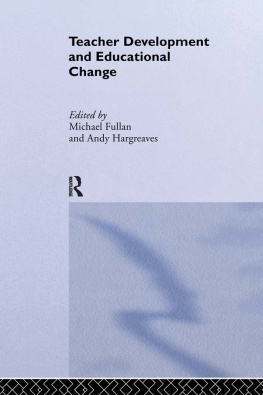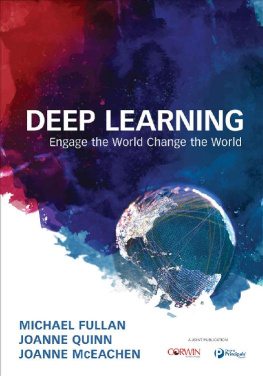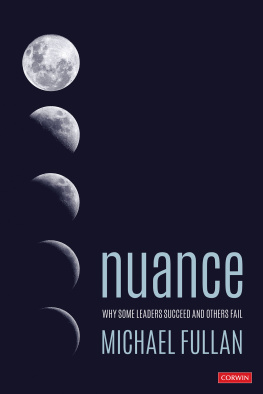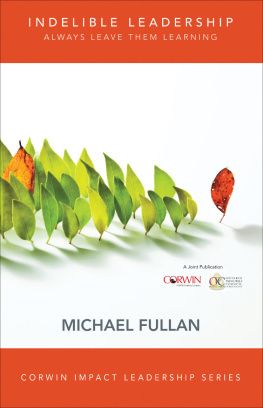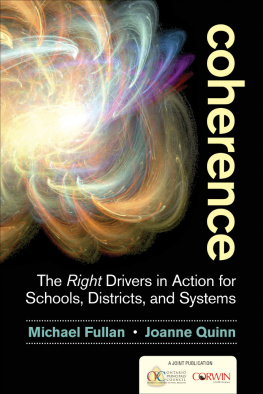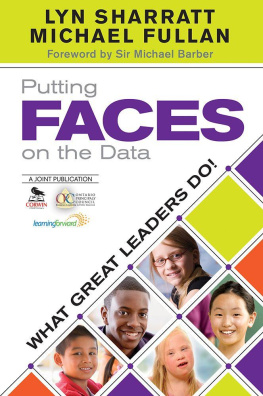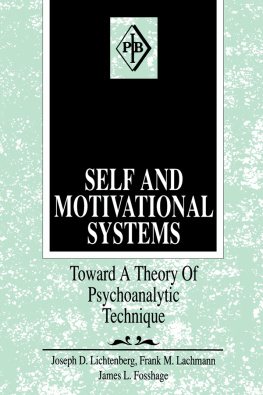Michael Fullan - Teacher Development And Educational Change
Here you can read online Michael Fullan - Teacher Development And Educational Change full text of the book (entire story) in english for free. Download pdf and epub, get meaning, cover and reviews about this ebook. year: 1992, publisher: Routledge, genre: Romance novel. Description of the work, (preface) as well as reviews are available. Best literature library LitArk.com created for fans of good reading and offers a wide selection of genres:
Romance novel
Science fiction
Adventure
Detective
Science
History
Home and family
Prose
Art
Politics
Computer
Non-fiction
Religion
Business
Children
Humor
Choose a favorite category and find really read worthwhile books. Enjoy immersion in the world of imagination, feel the emotions of the characters or learn something new for yourself, make an fascinating discovery.
- Book:Teacher Development And Educational Change
- Author:
- Publisher:Routledge
- Genre:
- Year:1992
- Rating:3 / 5
- Favourites:Add to favourites
- Your mark:
- 60
- 1
- 2
- 3
- 4
- 5
Teacher Development And Educational Change: summary, description and annotation
We offer to read an annotation, description, summary or preface (depends on what the author of the book "Teacher Development And Educational Change" wrote himself). If you haven't found the necessary information about the book — write in the comments, we will try to find it.
Teacher Development And Educational Change — read online for free the complete book (whole text) full work
Below is the text of the book, divided by pages. System saving the place of the last page read, allows you to conveniently read the book "Teacher Development And Educational Change" online for free, without having to search again every time where you left off. Put a bookmark, and you can go to the page where you finished reading at any time.
Font size:
Interval:
Bookmark:
Teacher Development and
Educational Change
Teacher Development and
Educational Change
Edited by
Michael Fullan
Andy Hargreaves

First published 1992
RoutledgeFalmer
Published 2013 by Routledge
2 Park Square, Milton Park, Abingdon, Oxon OX14 4RN
711 Third Avenue, New York, NY 10017, USA
Routledge is an imprint of the Taylor & Francis Group, an informa business
Selection and editorial material copyright Michael Fullan and Andy Hargreaves 1992
All rights reserved. No part of this publication may be reproduced, stored in a retrieval system, or transmitted, in any form or by any means, electronic, mechanical, photocopying, recording, or otherwise, without permission in writing from the Publisher.
A catalogue record for this book is available from the British Library
ISBN 978-0-750-70011-5 (pbk)
Library of Congress Cataloging-in-Publication Data are available on request
Jacket design by Caroline Archer
Typeset in 11/11 Berubo by
Graphicraft Typesetters Ltd., Hong Kong
Michael Fullan and Andy Hargreaves |
| Teacher Education and the Developing Teacher: The Role of Personal Knowledge Johan Lyall Aitken and Denis A. Mildon |
Patricia J. Sikes |
| The Nature of Collegiality in Teacher Development: The Case of Clinical Supervision Peter P. Grimmett and E. Patricia Crehan |
Kenneth A. Leithwood |
Louise Stoll |
Marvin F. Wideen |
Edward S. Hickcox and Donald F. Musella |
Judith Hlarren Little |
| Universities in Partnership with Schools and School Systems: Les Liaisons Dangereuses? Jean Rudduck |
Nancy Watson and Michael Fullan |
We would like to thank the Faculty of Education, University of Toronto, the Ontario Institute for Studies in Education, and the Social Sciences and Humanities Research Council for supporting the Inter-national Conference on Teacher Development. This book was de-veloped as a result of the conference held in Toronto in February 1989.
Michael Fullan and Andy Hargreaves
For something as obvious as the need to relate teacher development and educational change, it is surprising how little systematic attention has been devoted to understanding the topic and taking appropriate action. In fact, the focus on the link between teacher development and educational change is barely fifteen years old. In this chapter we want to trace this development briefly, indicate the unfinished agenda, and illustrate how the chapters in this book contribute to what has only very recently become a rapidly growing knowledge base.
We divide the period of research on teacher development since 1975 into two broad phases. The first phase analyzed the relationship between teacher development and successful implementation of innovationwe call this the innovation-focused period. The second phase takes the matter more deeply by considering the total teacher and the total school.
In some ways the logic and evidence linking teacher development to successful implementation of innovations is relatively straightforward, although there are a number of subtleties and complexities in the process. In a review in 1977, Fullan and Pomfret marshalled considerable evidence that demonstrated how teacher development and successful implementation of innovations were related. We observed that effective implementation consists of alterations in curriculum materials, instructional practices and behaviour, and beliefs and understandings on the part of teachers involved in given innovations. Put more simply, successful change involves learning how to do something new. As such, the process of implementation is essentially a learning process. Thus, when it is linked to specific innovations, teacher development and implementation go hand in hand.
At the time we learned that teacher development should be innovation-related, continuous during the course of implementation, and involve a variety of formal (e.g. workshops) and informal (e.g. teacher-exchange) components. We also confirmed that most innovation attempts did not incorporate these characteristics.
Since 1977, significant advances have been made in spelling out the processes involved in these relationships. Huberman and Miles (1984) captured these processes in their twelve case studies of school districts.
Large-scale, change-bearing innovations lived or died by the amount and quality of assistance that their users received once the change process was under way The forms of assistance were various. The high-assistance sites set up external conferences, in-service training sessions, visits, committee structures, and team meetings. They also furnished a lot of ongoing assistance in the form of materials, peer consultation, access to external consultants, and rapid access to central office personnel Although strong assistance did not usually succeed in smoothing the way in early implementations, especially for the more demanding innovations, it paid handsome dividends later on by substantially increasing the levels of commitment and practice mastery, (p. 273)
Huberman and Miles, along with others, also contributed new insights into the process of teacher learning, which included: the universal presence of early implementation problems in all cases of success, the role of pressure and support, the way in which change in practice frequently preceded change in beliefs and understanding, and the time-line of two or more years of active assistance during implementation.
Stallings (1989) in a series of experimental studies also demonstrated how staff development was connected to change in teacher practice, and in turn to increases in student achievement. Stallings found that teachers are more likely to change their behaviour and continue to use new ideas under the following conditions:
They become aware of a need for improvement through their analysis of their own observation-profile.
They make a written commitment to try new ideas in their classroom the next day.
They modify the workshop ideas to work in their classroom and school.
They try the ideas and evaluate the effect.
They observe in each other's classrooms and analyze their own data.
They report their success or failure to their group.
They discuss problems and solutions regarding individual students and/or teaching subject matter.
They need a wide variety of approaches: modelling, simulations, observations, critiquing video tapes, presenting at professional meetings.
They learn in their own way continuity to set new goals for professional growth. (Stallings, 1989:34)
The corner-stones of the model, according to Stallings, are:
Learn by doingtry, evaluate, modify, try again.
Link prior knowledge to new information.
Learn by reflecting and solving problems.
Learn in a supportive environmentshare problems and successes. (p. 4)
Joyce and Showers (1988) in their well-known theory-demonstration-practice-feedback-coaching model have shown rather conclusively that staff development is central to instructional change involving teaching models. In a more thorough test of the approach in Richmond County, Georgia, Joyce et al
Next pageFont size:
Interval:
Bookmark:
Similar books «Teacher Development And Educational Change»
Look at similar books to Teacher Development And Educational Change. We have selected literature similar in name and meaning in the hope of providing readers with more options to find new, interesting, not yet read works.
Discussion, reviews of the book Teacher Development And Educational Change and just readers' own opinions. Leave your comments, write what you think about the work, its meaning or the main characters. Specify what exactly you liked and what you didn't like, and why you think so.

